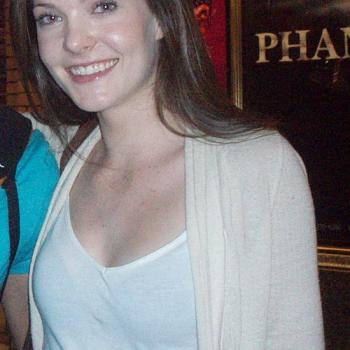
Source: Wikimedia
Creative Commons License
With the Confessional Poets, there’s candor, yes. But more than that there’s shame. There may indeed be pleasure in that shame, the smile that comes with admitting one is broken. That pleasure, however, is by necessity ambiguous. You can see it, for example, in the title of Anne Sexton’s “The Ballad of the Lonely Masturbator.” It’s even more apparent in the poetry itself:
The boys and girls are one tonight.
They unbutton blouses. They unzip flies.
They take off shoes. They turn off the light.
The glimmering creatures are full of lies.
They are eating each other. They are overfed.
At night, alone, I marry the bed.
If there is no sin in Sexton’s conception, there is sadness, atomization. She (the speaker, the poet by extension) is troubled and incomplete. Loving herself is beside the point. In this moment, there is only the knowledge of inadequacy, the only sort of confession that (in my experience) makes sense.
Confess we do, though we could not be further from such a sense of the term. Witness Bama Rush (2023), a documentary purporting to be about Greek Life at the University of Alabama. That description might lead you to expect an investigation, or, as the trailer suggested to many, a takedown. This country has put up with quite a bit of abuse coming out of the Hellenic system—what better time than now?
Bama Rush has little to do with sorority life. It plays up the various girls it follows in the lead-up to their matriculation, asking them about their experiences as young women. We hear of assaults, eating disorders, and the various, undeniably real, plagues faced by many girls and women. We hear from current sisters about the rigorous standards to which they are held (which I got the feeling we were supposed to resent, but what’s the point of an exclusive organization if it doesn’t demand things of its members?). We hear of the prominence of the University of Alabama, of the cabal of privileged Greek-Life members who run its student government (would that we heard more about this!). By the end, almost all the prospectives have dropped out on account of pressure from sororities. The filmmaker, Rachel Fleit, has been beaten by her subjects, forced into a retreat, searching for some way to finish her film.
That’s hardly her fault—a documentarian can’t know how things will go headed in. What baffled me was the film’s focus on the director as a person. I’d wager at least a quarter of the film concerns Fleit’s struggle with accepting herself (she has alopecia). Over and over, we hear through direct confessions into the camera about Fleit’s difficulties, about how she used to wear a wig, about how she accepts herself now. We’re supposed to take this honesty as a testament to the ubiquity of self-esteem issues; in essence, the director equates herself with these young would-be sorority girls.
Such candor comes so often (and with pictures!) that it begins to feel as if the movie is as much about the director as the supposed subjects. What, then, is the point? That all young women face tribulations? That self-image is often a sticking point? Surely no one would disagree. To say such is to call the sky blue—true but ambiguous in importance or salience. At best, this decision spreads the film’s already troubled premise thin, leaving us with little more than the sense that Fleit wanted to find a way to center her own story within the film. At worst, it sucks whatever value the story has out, vacuuming away any coherence from the broader movie.
According to Fleit, her own vlog-esque inclusion in Bama Rush was not her idea. That may indeed be true. I have no desire to disparage or attack Rachel Fleit (whose story—told on its own—might make for a fascinating documentary). But the very fact that anyone thought including the director’s teen years—devoid of sororities or Greek Life more broadly—had any relevance to the supposed topic of Bama Rush speaks to a broader trend in our society. We’ve laid claim to the raw honesty of Sexton, et al. with no sense of the ambiguity, the pain, or the shame. We’re expected to clap and cheer at every calculated utterance, to smile and nod at what passes for candor. But what’s the point of confession without ambivalence? What do we gain from knowing of another’s personal foibles without salaciousness or condemnation?
We gain nothing; we see nothing—nothing but boredom and a sense that the speaker thinks highly of themselves, expects us to care about them and their lives in detail. Anne Sexton, by contrast, cries: “I pray that God will digest me.”













